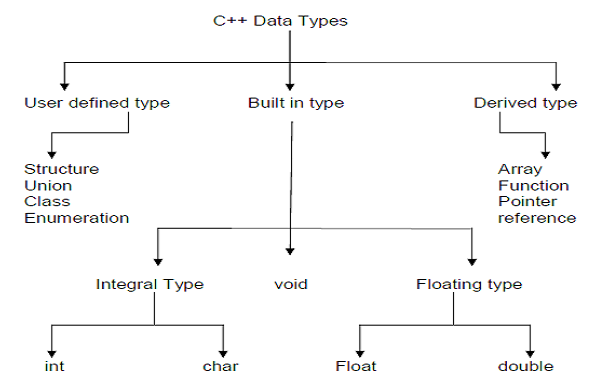
#BASIC DATA TYPES IN C CODE#
It has the same size, signedness, and alignment as std::uint_least16_t, but is a distinct type.Ĭhar32_t - type for UTF-32 character representation, required to be large enough to represent any UTF-32 code unit (32 bits). However, such requirement cannot be fulfilled on Windows, and thus it is considered as a defect and removed.Ĭhar16_t - type for UTF-16 character representation, required to be large enough to represent any UTF-16 code unit (16 bits). The standard used to require wchar_t to be large enough to represent any supported character code point. In practice, it is 32 bits and holds UTF-32 on Linux and many other non-Windows systems, but 16 bits and holds UTF-16 code units on Windows. It has the same size, signedness, and alignment as one of the integer types, but is a distinct type. Wchar_t - type for wide character representation (see wide strings). (since C++11) The signedness of char depends on the compiler and the target platform: the defaults for ARM and PowerPC are typically unsigned, the defaults for x86 and 圆4 are typically signed. For every value of type unsigned char in range, converting the value to char and then back to unsigned char produces the original value. Multibyte characters strings use this type to represent code units. Also used to inspect object representations (raw memory).Ĭhar - type for character representation which can be most efficiently processed on the target system (has the same representation and alignment as either signed char or unsigned char, but is always a distinct type). Unsigned char - type for unsigned character representation. Character types signed char - type for signed character representation. The value of sizeof ( bool ) is implementation defined and might differ from 1. Boolean type bool - type, capable of holding one of the two values: true or false. Note that fixed width integer types are typically aliases of the standard integer types. The extended integer types are implementation-defined. operator and the alignof operator (since C++11). Std::size_t is the unsigned integer type of the result of the sizeof operator as well as the sizeof. See arithmetic operators, in particular integer overflows. Note: integer arithmetic is defined differently for the signed and unsigned integer types. The following table summarizes all available integer types and their properties in various common data models: Note: as with all type specifiers, any order is permitted: unsigned long long int and long int unsigned long name the same type. Long long - target type will have width of at least 64 bits. Long - target type will have width of at least 32 bits. Short - target type will be optimized for space and will have width of at least 16 bits. Unsigned - target type will have unsigned representation Signed - target type will have signed representation (this is the default if omitted) Only one of each group can be present in type name. However, on 32/64 bit systems it is almost exclusively guaranteed to have width of at least 32 bits (see below). If no length modifiers are present, it's guaranteed to have a width of at least 16 bits. The keyword int may be omitted if any of the modifiers listed below are used. Integer types Standard integer types int - basic integer type. For example, ILP64 ( 8/8/8: int, long, and pointer are 64-bit) only appeared in some early 64-bit Unix systems (e.g. LP64 or 4/8/8 ( int is 32-bit, long and pointer are 64-bit).

#BASIC DATA TYPES IN C WINDOWS#
Win32 API (also called the Windows API) with compilation target 64-bit ARM (AArch64) or x86-64 (a.k.a.


ILP32 or 4/4/4 ( int, long, and pointer are 32-bit).LP32 or 2/4/4 ( int is 16-bit, long and pointer are 32-bit).The choices made by each implementation about the sizes of the fundamental types are collectively known as data model. Sizeof ( std:: nullptr_t ) is equal to sizeof ( void * ). Its values are null pointer constant (see NULL), and may be implicitly converted to any pointer and pointer to member type. It is a distinct type that is not itself a pointer type or a pointer to member type. Std::nullptr_t is the type of the null pointer literal, nullptr.


 0 kommentar(er)
0 kommentar(er)
